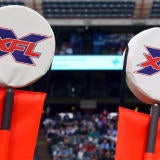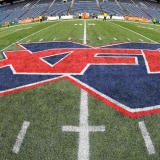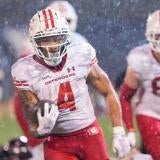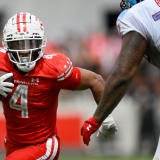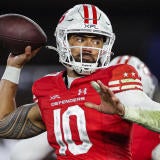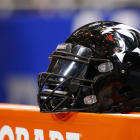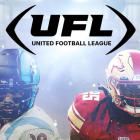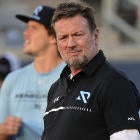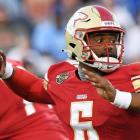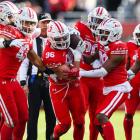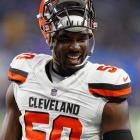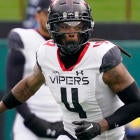It was Thursday, March 12, around 5:30 p.m. ET, when XFL players started calling their agents to pass along the news.
Their league had been canceled.
About two hours later, when the startup professional football venture made the official announcement, the terms were less harsh: "Currently, the XFL will not be playing its regular season games" -- with a promise to play "a full season in 2021" and beyond.
That may very well be true. There is general optimism among the XFL and its players that things will, eventually, return to normal. Pretty much the entire professional sports landscape has been forced to adopt the same hope, all while shuttering -- literally -- almost every major league in the wake of the global coronavirus (COVID-19) pandemic.
March Madness? Gone, at least until next year. NBA games? Postponed indefinitely. MLB Opening Day? Pushed back until mid-April, at the earliest. NHL games? Suspended indefinitely. The Masters? Pushed out of April for the first time since World War II. The 2020 Summer Olympics might be next.
The difference is the XFL was just getting started. Five weeks earlier, most people couldn't have named half, let alone all eight of the league's inaugural teams. On the flip side, in just those five weeks, the XFL had also grown to resemble the kind of genuine career stepping stool that so many of its players, coaches and staff failed to find elsewhere.
Put simply, when the XFL closed doors on March 12, it may not have closed only its own.
Any discussion of COVID-19's impact on the world at large has to start there: with the world at large. Regardless of personal opinion about advice for the general public (embrace "social distancing") or large-scale industries (from airlines to colleges to concerts to movies) suddenly valuing caution over convenience, the fact is the virus has spread rapidly, with more than 150,000 global cases and 5,700 deaths as of mid-Saturday.
In other words, no matter how unfortunate the XFL's shutdown may have been for fans, players and everyone in between, most understand that it was inevitable.
Some of the league's biggest names -- quarterbacks P.J. Walker and Jordan Ta'amu among them -- took to social media after the official announcement to share their gratitude for the abbreviated 2020 season and cast optimism on the future. Plenty of lesser-known teammates did the same. As a whole, one source told CBS Sports players think the XFL has been "extremely professional about communicating" during the abrupt process, especially about paying out salaries for games no longer on the schedule.
But that doesn't make what's transpired any less unfortunate.
Los Angeles Wildcats pass rusher Devin Taylor told CBS Sports that he understands the decision "from a world and health side," knowing "the risks that we are currently facing" and the fact "we don't know the true severity of it." But he also acknowledged "it's somewhat, from an athlete standpoint, frustrating because you want to play."
In truth, for many like Taylor, "playing" in the XFL isn't just that. The league successfully adopted a "For the Love of Football" slogan during its 2020 season, suggesting it would thrive as an alternative to the NFL, complete with genuinely competitive rosters, because its players -- many of them NFL castoffs or hopefuls -- simply loved playing the game. And don't get it twisted: Many of them do.
As Taylor explained, however, playing in the XFL was also about building -- or re-building -- bigger dreams.
"I would love to play another year in the NFL," he told CBS Sports a few weeks earlier, when COVID-19 was but a blip on countless Americans' radar. "It's what I want, as well as what all the players on my team want. The XFL is a good starting block, but I'm not settling till I'm back on the big stage."
Taylor, of course, already had a taste of the NFL before. He's not lacking a resume. He started opposite Jadeveon Clowney at South Carolina. He spent four years with the Detroit Lions after coming into the league as a fourth-round draft pick, logging seven sacks in 2015. He had a cup of coffee with the New York Giants.
But take P.J. Walker as another example. The Temple product, an undersized quarterback who went undrafted and then spent three years on and off a team's practice squad, just turned 25. He's never taken a single NFL snap. Within weeks of becoming the XFL's apparent MVP favorite as a human highlight reel with the undefeated Houston Roughnecks, he too was touting his XFL pedigree as a hopeful ticket to the big leagues, telling ESPN his goal was to return, permanently, to the NFL.
And the XFL, unlike so many startup leagues before it, was actually working. It was, at least to those on the inside, structured solidly enough to survive.
Vince Amey, Taylor's defensive line coach with the Wildcats, has experience at pretty much every level and league of football. He played in the NFL in 1998, the NFL Europe in 1999, the Arena Football League from 2001-07, even the original and first iteration of the XFL back in 2001. He's since coached in college, at Arizona, and in the now-defunct Alliance of American Football.
In the XFL, Amey explained weeks before the suspension of the season, "everybody's doing double duty, sometimes triple duty" because of the startup nature of the operation. ("In the NFL," he added, "they have the financial backing to get more things done quicker.") And yet everything about this league's structure, from the creative broadcast decisions (live mics on countless coaches, players and officials) to the actual broadcast partners ("being on ESPN and Fox and national TV week in and week out") contributed to a pervading belief that this XFL was more than capable of bringing the dreams of Devin Taylors and P.J. Walkers to life.
"I've had a few good buddies in college football, pro football, and they've had nothing but good things to say," Amey said. "People are surprised. It's a different feel, a different vibe here. There'e excitement in the air. The whole setup and the format has been well done. Are there little kinks to work out? Of course. But after every game, my phone's blowing up."
Now? All of those dreams -- all of that excitement -- has been put on hold.
Are we to pity pro athletes, coaches and league executives over those affected by the virus that's basically put all of sports on pause? Are we to pity them over those who no doubt will be affected by COVID-19 in the coming weeks and months? No. A good portion of these XFL players have already gotten a taste of the pro spotlight. A handful of them have already made decent money doing so.
But just as many of them are like Walker or Ta'amu or Cam Phillips, the superstar Roughnecks wide receiver who spent 2019 out of football, or Kenny Robinson, the St. Louis BattleHawks safety who opted to overlook additional college eligibility to provide for his mother, who'd been diagnosed with cancer. All of these young men seemed to stumble upon the perfect home for a blossoming life and career, only to see it thrown in jeopardy. And that's not accounting for the guys whose names you didn't learn during the five-week 2020 season -- the ones who may not get the same shot in 2021 even if the XFL returns.
In the grand scheme of things, sports are trivial. Football is trivial. But just like any other profession, there are livelihoods at stake.
There's also a reason we come back to sports and, specifically, the gridiron every fall -- or, in the case of the XFL, every spring. There's an inherent sense of community there.
When the XFL kicked off less than a week after the Super Bowl this February, it may have been odd to see former Ohio State star Cardale Jones decked out in red, repping the nation's capital with the DC Defenders. It may have been hard to root for any specific team knowing the majority of each club's roster was full of players far less proven or talented than your average NFL Joe.
But a community still formed. Fans poured into NFL venues to watch XFL matchups. Walker's highlights went viral. So, too, did stuff like New York Guardians QB Matt McGloin throwing his entire coaching staff under the bus.
For five weeks, the XFL lived and breathed. At worst, it offered an escape from the kind of big-picture issues that now dominate our headlines. At best, it served not only as "more football," but a launching pad for the game's next generation.
Its sudden disappearance, if not comparatively heartbreaking, at least reinforces the surrealism of a totally interrupted society.
There are, of course, also some silver linings.
Most notably, the abrupt end to the XFL's season has reportedly triggered an early release of players to contracts with other leagues. In other words, someone like Walker or Taylor or Phillips could conceivably sign with an NFL team earlier than expected, and with 2020 free agency right around the corner, there might never be a better time for XFL standouts to get the promotion they've been seeking.
Perhaps even more importantly, everyone is now free to go home. Players. Coaches. Scouts. Fans. With everything on hiatus, there's little else to do but that. On Friday, in fact, a day after the XFL's big announcement, one team staffer told CBS Sports that one of the largest sentiments, after the initial disappointment of the news, was everyone being "ready to see loved ones."
Maybe, at this time, that's what we need most anyway.






